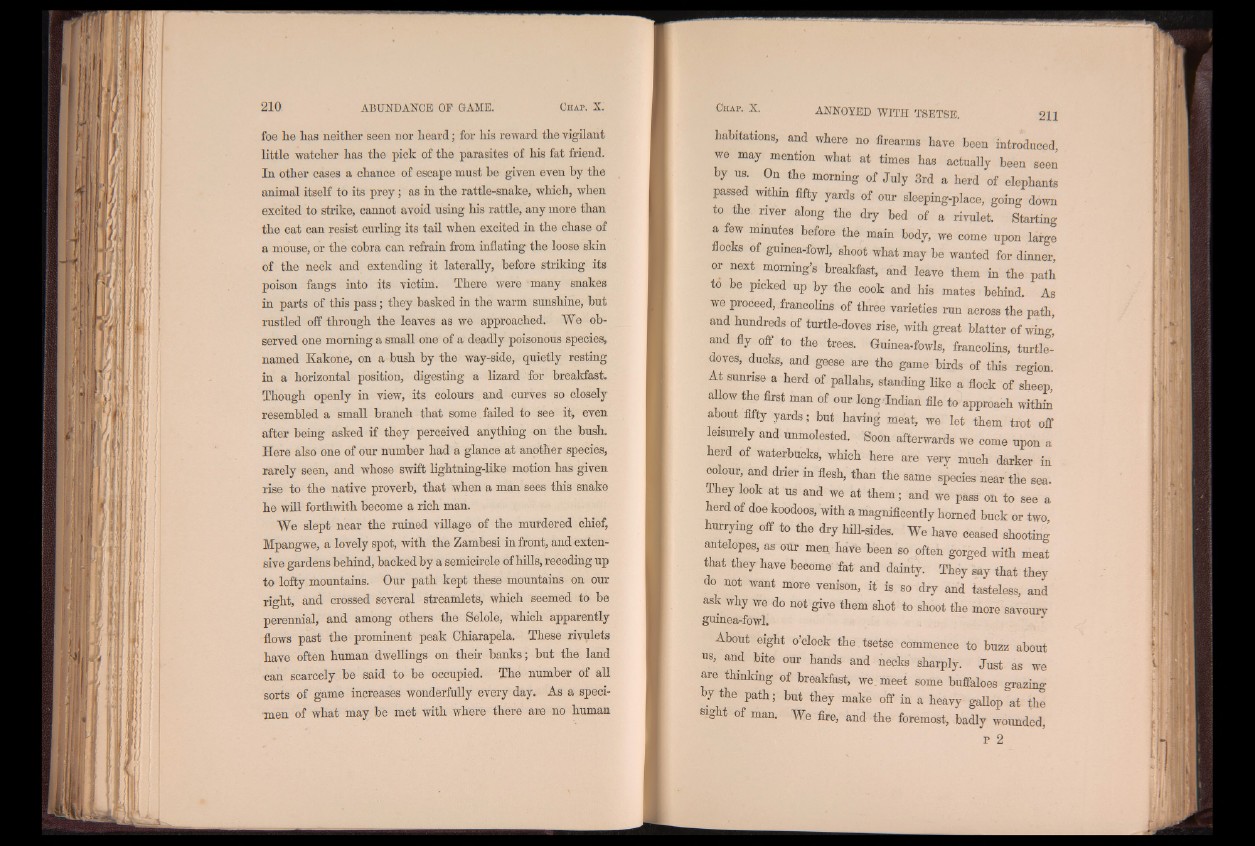
foe he has neither seen nor heard; for his reward the vigilant
little watcher has the pick of the parasites of his fat friend.
In other cases a chance of escape must he given even by the
animal itself to its prey; as in the rattle-snake, which, when
excited to strike, cannot avoid using his rattle, any more than
the cat can resist curling its tail when excited in the chase of
a mouse, or the cobra can refrain from inflating the loose skin
of the neck and extending it laterally, before striking its
poison fangs into its victim. There were many snakes
in parts of this pass; they basked in the warm sunshine, hut
rustled off through the leaves as we approached. We observed
one morning a small one of a deadly poisonous species,
named Kakone, on a hush by the way-side, quietly resting
in a horizontal position, digesting a lizard for breakfast.
Though openly in view, its colours and curves so closely
resembled a small branch that some failed to see it, even
after being asked if they perceived anything on the bush.
Here also one of our number had a glance at another species,
rarely seen, and whose swift lightning-like motion has given
rise to the native proverb, that when a man sees this snake
he will forthwith become a rich man.
We slept near the ruined village of the murdered chief,
Mpangwe, a lovely spot, with the Zambesi in front, and extensive
gardens behind, backed by a semicircle of hills, receding up
to lofty mountains. Our path kept these mountains on our
right, and crossed several streamlets, which seemed to be
perennial, and among others the Selole, which apparently
flows past the prominent peak Chiarapela. These rivulets
have often human dwellings on their banks; but the land
can scarcely be said to be occupied. The number of all
sorts of game increases wonderfully every day. As a specimen
of what may be met with where there are no human
habitations, and where no firearms have been introduced
we may mention what at times has actually been seen
by us. On the morning of July 3rd a herd of elephants
passed within fifty yards of our sleeping-place, going down
to the river along the dry bed of a rivulet. Starting
a few minutes before the main body, we come upon large
flocks of gumea-fowl, shoot what may be wanted for dinner,
or next morning’s breakfast, and leave them in the path
to be picked up by the cook and his mates behind. As
we proceed, francolins of three varieties run across the path,
and hundreds of turtle-doves rise, with great blatter of wing,
and fly oft to the trees. Guinea-fowls, francolins, turtledoves,
ducks, and geese are the game birds of this region.
At sunnse a herd of pallahs, standing like a flock of sheep
allow the first man of our long,Indian file to approach withk
about fifty yards; but having meat, we let them trot off
leisurely and unmolested. Soon afterwards we come upon a
herd of waterbucks, which here are very much darker in
colour, and drier in flesh, than the same species near the sea.
They look at us and we at them; and we pass on to see a
herd of doe koodoos, with a magnificently homed buck or two
hurrying off to the dry hill-sides. We have ceased shooting
antelopes, as our men have been so often gorged with meat
that they have become fat and dainty. They say that they
do not want more venison, it is so dry and tasteless, and
ask why we do not give them shot to shoot the more savoury
gumea-fowl.
About eight o’clock the tsetse commence to buzz about
us, and bite our hands and necks sharply. J ust as we
are thinking of breakfast, we. meet some buffaloes grazing
y the path; but they make off in a heavy gallop at the
sight of man. We fire, and the foremost, badly wounded,
p 2